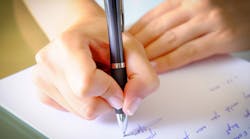Drafting a thank you letter: It's important for hygienists to express gratitude
By Diana Macri, RDH, BSDH, MSEd, MAADH
“I will also grudgingly tell you the hidden secret of thank you notes: They improve the frequency and quality of the gifts you receive. People like being appreciated, and if they feel you actually notice the nice things they do for you, they’re more likely to give an encore performance.” — Leslie Harpold, a pioneer in web design
I couldn’t agree with Leslie more. I can personally attest to the power of the thank you letter. Through the years I have written and received quite a few. Always, whether I was the giver or receiver, I was made gratified by the process.
------------------------------------------------------------------
Other articles by Macri
- The dental professional's role in HIV education: It's an ethical responsibility
- How to avoid burnout as a dental hygienist
- RDH to business pro: How being a private contractor can help you
------------------------------------------------------------------
When I was in high school, we were taught how to write thank you letters. At that time, the interwebz didn’t exist and people still wrote letters. On paper. With a pen. I didn’t fall in love with the idea of written letters, however, until I read a biography of John Adams. This was the first time I had been exposed to the tender correspondence between the second U.S. president and his wife, Abigail. In these letters, we see the customs of a time long gone, when expressions of warmth and affection were seen as a good thing. The letters between John and Abigail Adams secured one to the other in their times of separation. If you have the opportunity, seek them out. You will not be sorry you did.
Taking the time to write a letter to show your appreciation differentiates you from others. It signals to the receiver that you have good manners and elegance, which is something that is in short supply in our society. It also signals to the recipient that you are in possession of soft skills, which will further promote your effectiveness as a health-care provider. Soft skills are personal qualities, attitudes, and habits that allow you to work positively and harmoniously with others. We used to call them “social graces.” They are things like empathy, authenticity, optimism, public speaking, and problem solving skills. People who possess soft skills are the people who employers want to hire and employees want to work beside.
Thank you letters can be (should be) written to anyone who has done something kind for you. It’s appropriate to send a thank you note:
- After attending a job interview.
- After receiving a promotion or raise.
- After a business lunch, dinner, party, or networking event.
- When a new acquaintance has given you advice.
- When a manager, professor, or colleague has supplied you with a reference letter.
- To co-workers who’ve given you a gift.
It is generally agreed that a thank you letter should be sent out within 24 hours of the event that precipitated the letter. While I agree that the letter should be sent soon after, I don’t think it has to be within 24 hours. I’ve received letters weeks after interactions with colleagues and/or students, and I have appreciated it as much as letters I received immediately after an event.
What’s most important is the content of the letter and how well you communicate your emotion. To make a thank you letter really special, find a way to personalize it. If you noticed the recipient favors the color red, for example, write your thank-you note on a notecard with a red picture on it. I once searched high and low for stationery that matched the Tiffany’s color. My friend loves Tiffany’s and I thought it’d make her happy to see the stationery in their iconic color.
There are many formats that can be followed, but no one is better than the other. Here is a sample format you can utilize:
[Date]
[First and Last Name of Recipient]
[Address]
[City, State, Zip]
Dear [Name or Organization Name],
First paragraph: State the purpose of your letter.
Second paragraph: Discuss the event that precipitated you writing the letter; include aspects which were particularly interesting and/or helpful to you.
Third paragraph: Close by thanking the person again. You may also want to wish the recipient success in their endeavors or express your desire to meet with the recipient again in the future (“I look forward to seeing you again at the ADHA annual session in August”).
Sincerely,
[Sign your name here]
[Type your name]
[Your address]
[City, State, Zip]
Some additional tips when writing a thank you letter include:
- Write clearly and concisely.
- Double-check for typos and grammatical errors.
- Express yourself.
- Be sincere.
- Use quality paper.
- Do not be superfluous or overly wordy.
I’ve referred to thank you letters written by hand on paper, but I think using email to deliver the letter is fine. Some career experts disagree but, again, what’s most important is that you write a sincere letter.
There are a plethora of websites which can help you write a thank you letter, complete with templates and sample letters. I particularly like Emily Post.
Diana Macri, RDH, BSDH, MSEd, MAADH, is based in New York City and is the co-author of the hygiene blog Empire Hygeniuses. Currently she is an assistant professor at Hostos Community College and continues to practice in a multi-specialty practice in Staten Island. She is a strong advocate for the profession and seeks to promote its expansion and visibility.






